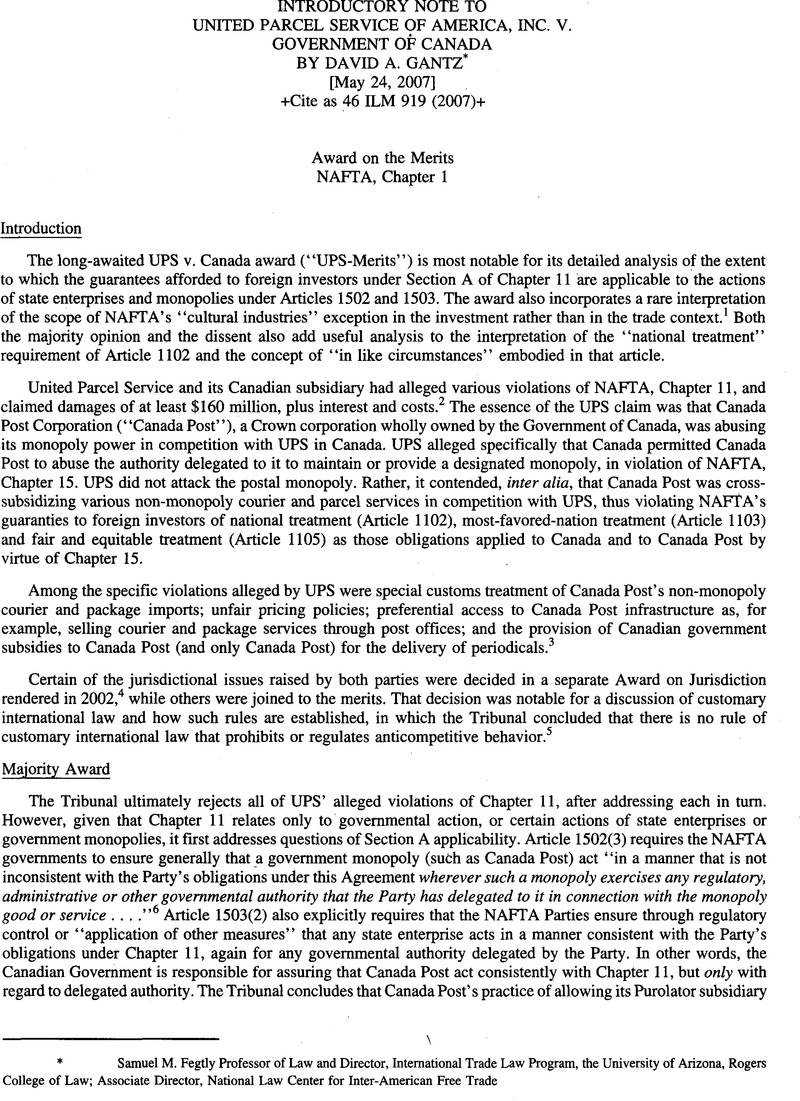Published online by Cambridge University Press: 27 February 2017

* This text was reproduced and reformatted from the text appearing at the website of the International Centre for the Settlement of Investment Disputes: <http://www.worldbank.org/icsid>.
International Legal Materials would like to thank Todd Grierson-Weiler for facilitating the publication of this decision.
† Jean-Marie Henckaerts is a legal adviser in the Legal Division of the ICRC and head of the ICRC's project on customary international humanitarian law. The views in this article are those of the author and do not necessarily reflect those of the ICRC. This response is based, in part, on Jean-Marie Henckaerts, "Customary international humanitarian law: A rejoinder to Judge Aldrich", British Year Book of International Law, 2005, Vol. 76, 2006, pp. 525-532; Jean-Marie Henckaerts, "The ICRC Customary International Humanitarian Law Study: A rejoinder to Professor Dinstein", Israel Yearbook on Human Rights, Vol. 37, 2007 (forthcoming); and "ICRC's Jean-Marie Henckaerts responds to my comments on ICRC Customary Law Study", Kenneth Anderson's Law of War and Just War Theory Blog, 24 January 2006, at <http://kennefhandersonlawofwar.blogspot.com/2006/01/icrcs-jeanmarie-henckaerts-responds.html>.
1 No such exception appears in the WTO Agreements; see Appellate Body Report, Canada-Certain Measures Concerning Periodicals, WT/DS31/AB/R, adopted Jul. 30, 1997 (holding that Canada's differing tax treatment of local and U.S. periodicals violated GATT, art. 111:2).
2 Notice of Arbitration, Apr. 19, 2000, available at <http://naftaclaims.com/Disputes/Canada/UPS/UPSNoticeOfArbitration.pdf.>
3 Id.; see also Canadian Government News Release and Backgrounder, Canada Welcomes Favourable Decision on UPS Legal Challenge, Jun. 13,2007, available ar <http://w01.international.gc.ca/MinPub/Publication.aspx?isRedirect=True&publication_id=385211&Mode=print>.
4 United Parcel Service of America Inc. v. Government of Canada (Award on Jurisdiction), Nov. 22, 2002, available at <http://www.international.gc.ca/tna-nac/documents/Jurisdiction%20Award.22Nov02.pdf> (last visited Sep. 28, 2007) [hereinafter “UPS-Jurisdiction” ].
5 Id., paras. 83-87, 92.
6 NAFTA, art. 1502(3); emphasis supplied.
7 UPS-Merits, paras. 62, 78.
8 Id., para. 148.
9 Id., paras. 173, 181.
10 10 Id., para. 93.
11 Id., paras. 102,103. The Tribunal noted that Canadian customs procedures comply with Universal Postal Convention and Kyoto Convention. Id., paras. 118, 119.
12 Thus, the Procurement exception to NAFTA obligations in art. 1108(7)(a) is applicable.
13 Referring to UPS-Jurisdiction, para. 92.
14 Id., para. 182; see NAFTA Free Trade Commission, Notes of Interpretation of Certain Chapter 11 Provisions, Jul. 31, 2001, available at <http://www.international.gc.ca/tna-nac/NAFTA-Interpr-en.asp.>
15 NAFTA art. 1105 provides that “Each Party shall accord to investment of investors of another Party treatment in accordance with international law, including fair and equitable treatment and full protection and security.” The Notes of Interpretation effectively redefine (or clarify that) “international law” as used in Chapter 11 means “customary international law.” Thus, fair and equitable treatment is required under NAFTA only to the extent that it is required by customary international law.
16 UPS-Merits, paras. 183-184, 186-187.
17 UPS-Dissent, para. 204.
18 Id., para2. 2, 205.
19 Id., paras. 22, 53.
20 Id. paras. 172-173.
21 W.,paras. 80, 148, 150.
22 Steven Shrybman,, Briefing Paper: United Parcel Service (UPS) v. Canada, Jul. 2007, available at <http://www.policyalternatives.ca/documents/National_Office_Pubs/2007/NAFTA_and_UPS.pdf >(prepared for the Canadian Centre for Policy Alternatives).
23 NAFTA, art. 1136(1) provides that "An award made by a Tribunal shall have no binding force except between the disputing parties and in respect of the particular case." Notwithstanding that invocation, NAFTA tribunals and the parties appearing before them commonly discuss earlier awards when they are considered relevant either by the arbitrators or the parties.
24 Canadian Government Press Release and Backgrounder, op. cit.
1 Under article 1505, "'non-discriminatory treatment' means the better of national treatment and most-favored-nation treatment, as set out in the relevant provisions of this Agreement", that is in articles 1102 and 1103.
2 UPS recognizes this. See: Investor's Memorial, paragraph 354.